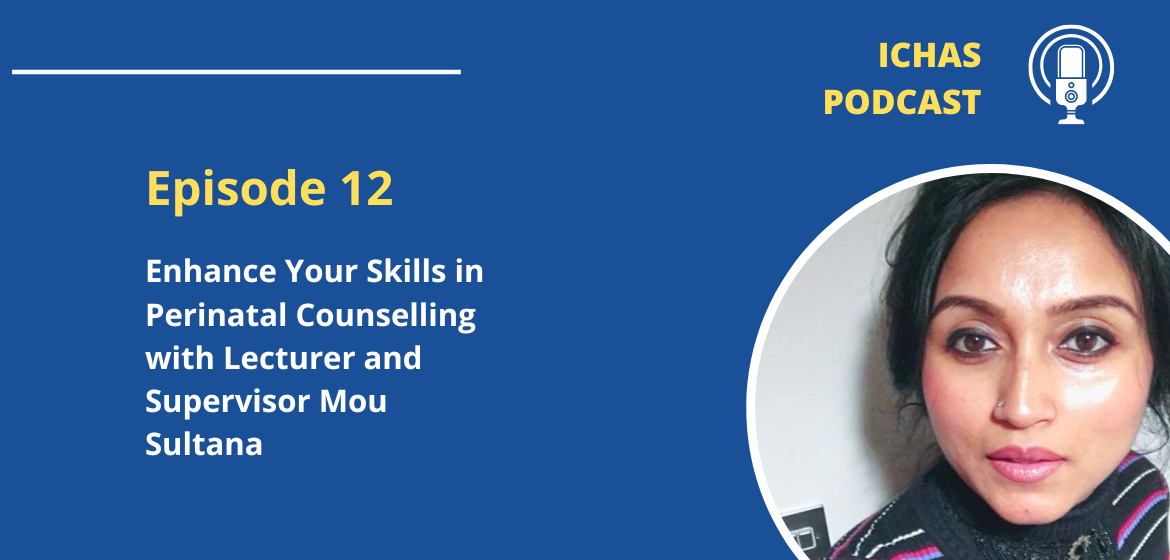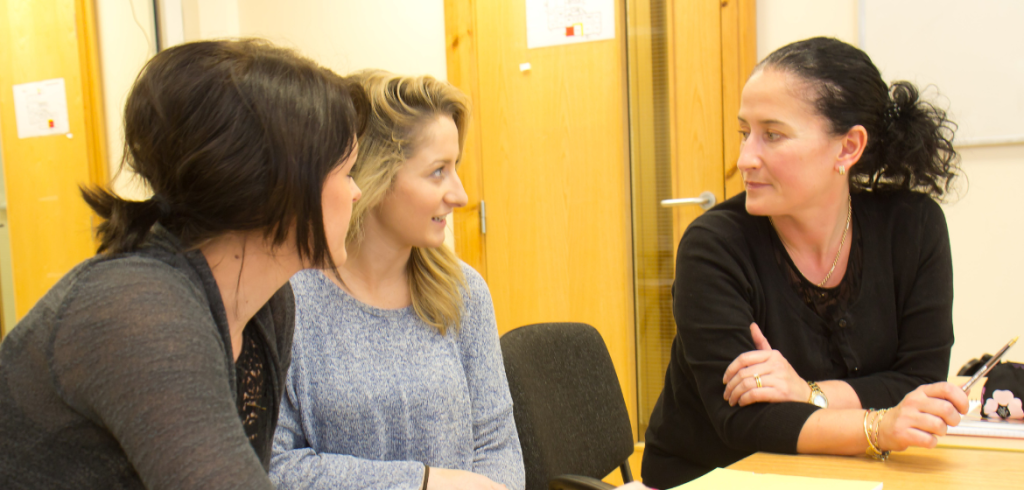
Enhance Your Skills in Perinatal Counselling with Lecturer and Supervisor Mou Sultana
Mou Sultana, lecturer and supervisor here at ICHAS recently chatted with us about perinatal counselling. We discussed what it involves, how it can help individuals and couples prepare for pregnancy, childbirth, and early parenthood and also how it is a relatively new area in the field of counselling.
What is perinatal counselling and like, why is it important?
So essentially, perinatal, counselling isn’t a field that is distinct yet and that’s where my research and work comes from in that I’m trying to bring this to people’s attention, I suppose, practitioners, researchers, that we all know that this field requires significant skills that are specific to this field, but there is not much enough material that aims at developing those skills, and then transmitting them to practitioners.
So essentially, my research looked at that area and that’s what I was finding there’s a huge gap between what’s being practised and what’s being delivered as training material. Because there isn’t enough training material that particularly looks at that counselling. So perinatal counselling would mean that you’re looking at counselling people who are either pregnant between four to five, six weeks gestation, or they’re trying to get pregnant, which means fertility counselling as well. There’s a blur and that’s what I’m trying to say, in perinatal counselling definition, that there is a blur between that for fertility counselling and the time you get pregnant, but also pregnancy loss up until birth, post birth, it would be five years.
But it doesn’t have to be alive birth. So it could have been a pregnancy loss, or a child loss and perinatal counselling still is appropriate in that field. Because with perinatal counselling, I’m trying to conceptualise along with existing very small literature that is available, it seems that the idea of a child is the most important bit, not the actual child or the presence or absence of a child.
So it sounds like there’s a gap between what’s actually happened in real life, it sounds kind of like it’s an area where you’re nearly learning as you’re on the go and it sounds like one of those where you need to have some sort of training beforehand, rather than be learning from each experience or each situation as it comes.
Absolutely. So what I have seen so far is that counsellors and psychotherapists would be practicing within this field, but they’re not probably calling perinatal counselling. So they’re probably saying pregnancy counselling, antenatal counselling, or fertility counselling. But essentially, fertility counselling is the only field that perhaps is distinctly defined because of the latest advancements in technology in terms of ART, which is advanced artificial reproductive technology.
But apart from that practitioners who are performing in this area, they’re not really trained in a particular way. But they’re bringing in skills and like you said, learning on the job and in terms of allied health professionals, such as nurses and midwives. We recently had a course that started the year before last, I think, into perinatal mental health, but even that one does not really focus on counselling or the therapeutic aspect of working with a person it more focuses on the other aspects, the medical and allied health.
How can perinatal counselling help individuals and couples prepare for pregnancy, childbirth, and early parenthood?
So first of all, the scope of the perinatal counselling, yeah, is very broad. You are involving people who are thinking about getting pregnant, you’re involving people who are trying to get pregnant, you’re involving people who have gotten pregnant, involving people who have then given birth and have young children at home under the age of five.
So within this field, then you have the person who’s trying to get pregnant or is pregnant or has a child, but also the partner and sometimes it could be partners for diverse sexual relations, such as polyamory or others, there could be also partners not living in the same place. That means you’re doing co-parenting, that could be partners who are not in a romantic relationship. So this could be your parent or somebody else helping you out with the child. So whoever is co-parenting with you, they’re also involved in this perinatal counselling, they could be involved so they could be coming in as a client. But you could use the prenatal counselling scope with them, even though they are not the person who gave birth.
That sounds like a minefield from the counsellor’s perspective.
It is pretty broad. Yes, absolutely. But essentially, with perinatal counselling this course would highlight is that it will give you an understanding of what scope you have in approaching the counselling field with perinatal counselling in mind, it will also then give you a clearer understanding as to what are your boundaries where you cannot go beyond which, and it’ll give you an understanding of the current assumptions people hold in terms of this field, such as one of the biggest assumption we have is every client has is that this phase is meant to be really bliss.
Everything is meant to be rosy and perfect because you waited for this child and even those who are waiting for children and struggling with the medical world in getting pregnant or having a live birth and healthy birth. Even there, you would see high rates of postnatal depression. So you’d kind of wonder what’s going on and the point is that we glamorise this phase a lot. So with perinatal counselling, this course will really show you how to address that glamorisation, that kind of puts a whole new burden on the people who are trying to parent whether on their own or with the help of somebody else or their partner or ex-partners.
But also it will show you as to a particular model that I have developed from my own work in UCD, in the School of Medicine, and that model is probably the only model at the moment in the perinatal counselling field. This is an integrative model and you can work with that. So the course will go through that model as well.
What are some of the strategies that perinatal counselling can provide to manage the stress and anxiety both during and after pregnancy?
If you are going to look at not just the parenting bit, so when somebody comes in and talks about having a young child at home, or having just given birth or lost a child, I think we tend to focus on that piece between the child and the parent. But this counselling course will show you very, particularly what I think is not quite therapeutically useful because essentially, something happens when somebody gets pregnant. Something happens to the people around them as well, when they get when this person gets pregnant. The major thing that happens is somebody transitions from not being a parent to a parent.
But we tend to think that as soon as the baby is handed over to you covered in blood in the hospital, you become a dad or a mom. But that’s not quite true, it takes a long time to kind of get into that mindset of becoming a mother. So most of the time, the distress that a person is presenting is related to this transitionary phase of that identity and all the complications that come hand in hand, which means people that they are dealing with during this transition, which means family members or partners or ex-partners.
Then because there is a third person involved now in this relationship, assuming there was two before this, whether they were together or x. Now you have a completely new subjectivity, which is the baby who does not really listen to you and does not really follow your routine. You can’t really put it on the wall and say, you know, let it hang there while I do this. You can’t really get away from this. This is always and everywhere. So, you can’t even go take care of your personal hygiene. So you can see how distress will come in every now and then when you see somebody else is being able to take a shower, and you can’t or somebody else is going to job and talking to adult people but you can’t or you want to do what you want to do with a child but because of the situation and finances, you have gone back to work and started talking to adults when you actually want to do gobbly goo with the baby.
So there are different types of dynamics in there. For reasons why people would be distressed, but usually, it is the interpersonal dynamic, it’s the relationships. It’s the by-product of the transition that the person is going through as they become a parent and it’s these things that need to be addressed and looked at.
So for us, somebody really needs to not assume anything, because we tend to assume a lot. That’s what I saw in my research when I was talking to midwives, I was asking them what is it like to work with patients who have perinatal mental health difficulties, and all I could see is that they were drawing from their own parenting experiences or their experiences of being parented. Or that assumption that a child is a natural thing, or becoming a mother is a natural thing. These are massive assumptions we make that this nature versus nurture debate, or this concept of femininity or masculinity, or what a father is or what a mother is, these are absolutely elusive words, and yet we take them such concretely and most of the stresses during this period comes from these assumptions that we make, or these high standards that we have set.
As you said, it’s crucial for the counsellor to not assume just because their own experience was like this, that this person is going to be the exact same.
Yeah, it’s, it’s tough if you’re working one-to-one, but what perinatal counselling also allows you to do is to give skills to the person and not considered the person as somebody who already has the skills or needs to be taught, because none of us actually need to be taught this type of communication or understanding what’s going on. I think, instead of working with the other persons in that family, or household, or whoever your client is dealing with, the counsellor can have a technique of dealing with their client, helping them see things evoke questions within them as to where is it coming from, and provide them with the motivation that the client themselves will deal with this in their own way, because, as I would believe, and I think most counsellors would believe that the clients are the experts in their own field, because they are living that life for that many years that they’re alive.
We only see snippets of them. So I think with perinatal counselling, you’ll give them skills and knowledge and help them evoke and understand certain aspects and give them techniques of communicating and recognising patterns so that they can themselves use it as they please because this is such a minefield and the time after the child is when most things can go wrong. So if we assume that by talking to another person, things will happen, or things will be going smoothly, I think we might do more damage.
What are the biggest benefits of attending these kinds of counselling sessions?
So, if you’re attending as a couple, you would get the opportunity to learn about what’s happening in your household, because remember, it’s a third or fourth or fifth person in your life. You may have pre-existing children, and this is a new person as well. We don’t know the subjectivity and the personality of this new child. We really have to open up a space where people are listening to one another, and they’re open to these new rules coming in and so counselling will do that and will prepare them to have empathy and awareness and understanding and openness to actually navigate and negotiate and be available for one another with the very fact that this is a whole new timetable a whole new lifestyle, and is not going to work unless there’s communication going on.
There are so many times that the couple would say, “But I didn’t know you were thinking that”.
So somebody may have given you, absolutely somebody may have given you a huge roar, just because you put the cup in the wrong place and you don’t know what that was. But what went on in that head right then and there is that I am working 24/7 I’m listening to this screaming child, I’m minding that child, I’m cleaning and poop, the poop and blah, blah, blah, and I’m also doing household and then I’m making chores, I’m doing chores that are created by you. So I’m essentially minding all of these people inside the house while you can take a shower and poop and scroll on your phone and talk.
Now, nobody is saying these things. All you hear is why on earth would you put that down there? So just one second. What this type of counselling does is it really helps you slow down talk time and see things from a microscope in terms of understanding and then gives the person an opportunity to actually voice that so that the other person hears it. Because even the person roaring doesn’t know why they are roaring. It really slows down time and gives them awareness.
What models have you found when it comes to perinatal counselling?
Yeah. So my research has reached basically all the way to the development of a model that is the only integrative perinatal counselling model at the moment. I call that the becoming model and it’s the becoming model because you don’t just become a parent, so the ing is denoting the fact that it’s a constant process and it’s a transitionary phase.
We don’t know when that will actually happen. But it is happening now so the becoming model. Essentially where that came from is because right now the field of perinatal mental health is completely changed for good. But what happened in 2016 2015, around that time, when I was in the middle of studying this was there was no particular perinatal mental health team, there was a perinatal specialist, psychiatrist, and there were only two or three of them in this country and that’s pretty much it so they would lead their own team. But there was not a big team in the way there is today.
What you have had was for example, let’s say if there was a bereavement care following pregnancy loss, a book that was published by the HSE in, I think 2016. They mentioned the question of perinatal mental health and it was just one paragraph, and you had a maternity strategy, a 133 page that was published in 20 2016. Even then they talked about mental health in just one page. So, the emphasis on measuring mental health wasn’t there, but it is now.
That’s where the model comes in that it highlights that it’s not just death that you have to think about perinatal mental health, it’s not just an unhealthy baby, or grieving or loss that you have to think about. Perinatal mental health is useful for everybody because essentially, every person goes through that transition and what will happen? We don’t know. But technically, we know that it could even trigger psychosis in some and that means one in 1000 might have a psychosis, psychotic episode or break, but at least 100% of women or those who identify as women and or giving birth will be going through this type of transitionary phase and we don’t know what will happen.
It sounds like it’s a relatively new area in a field which has been around since, forever.
It is. Oh, yes. Well, I mean, even the postnatal depression word I mean, as soon as you see the mental health people think of postnatal depression, but even that it wasn’t in the DSM (Diagnostic Statistical Manual) and it still isn’t in the DSM. It’s a term that people have constructed and prepared. But there is no postnatal depression in the DSM and that will tell you as to we’ve been experiencing this since the dawn of civilisation, but we haven’t really named it and people like celebrities who started naming things in the 80s and 90s and that’s how the name came up.
So there are very few practitioners who actually focus on this, like I said, there’s two or three perinatal psychiatrists in Ireland and then you have perinatal. They’re not called perinatal, but they are psychiatrists who call themselves reproductive psychiatrists in America, they would look at, like I said, the fertility and pregnancy and everything together they would look at. So there are very few people who are actually working in this field.
How does perinatal counselling involve and collaborate with other healthcare providers involved in a person’s or couple’s perinatal care?
Oh, absolutely, that’s why because your team is so big. So for instance, in our own HSE system, you would see their social workers, nurses, midwives, doctors, psychiatrists and your psychologist all together. But when you’re working with perinatal counselling, it is useful to network with others who are involved in the care of this person, such as your GP and other medical professionals and allied health professionals who are involved, and sometimes your physio as well, because a lot of physical changes go through. It is useful for the counsellor to have networks with all these allied health professionals.
You mentioned earlier as well in around infertility and pregnancy loss. How does perinatal care address and support individuals or couples who may be going through something like that as well?
Essentially, when you are planning to have a child or you’re struggling to have a child that you have started the planning already, in both these cases, the question of what it is what it means to be a mum, or to be a dad or to be a parent, these questions become so apparent, but we don’t really get a space to think about these questions. But the idea of what a mother is and what a father is and what that represents is most of the time that’s what sits at the very, very core and it keeps bouncing or reflecting on to other symptoms coming up.
So during that phase, if somebody is attending perinatal counselling, it is giving that space to address the very core and underneath questions that are very foundational and phenomenological.
There’s a certificate that the college will be running, what are the benefits of taking the course?
If you are attending the course it’s going to give you ideas about what perinatal counselling is, how, what the scope and the field of it is, and how are you to practice perinatal counselling within your existing practice? How can you incorporate it, it’s also going to help you identify who your client is.
For instance, somebody else may have come in, but they have mentioned something that may tell you that this is a perinatal client and it will also give you a very clear understanding of baby blues, postnatal depression and psychosis, the three major things that occur and how to work with them or identify them or where to go with them.
It will also give you some basic knowledge about the difference between the medical model and the becoming model, which is the counselling model and also you’re going to learn about major theories of postnatal.
So you’re going to learn about those basic theories, major theories, how you conceptualise postnatal depression, you’re going to learn about what way you could assess and signpost if you’re seeing things that are problematic and you’ll also want to learn from case studies that actually give you examples that you can see in your own clinic as well and of course, the referral pathways and the limitations of this entire model.
What’s the number one piece of advice you would give say to anyone who’s thinking of developing skills in the area of perinatal counselling?
Consider this field as a significant field that requires distinct skills. So, if you want to really work in this area, consider that you want to be ethical and develop your skills in a structured fashion, not just learn at the job and go by when there is existing research available, broaden your horizon and be skilled in this field.
Short Course: Introduction to the Integrative Perinatal Counselling Model
If you’re interested in attending this short course which is delivered online over the course of three weeks starting this September then go to the short course page today.

























